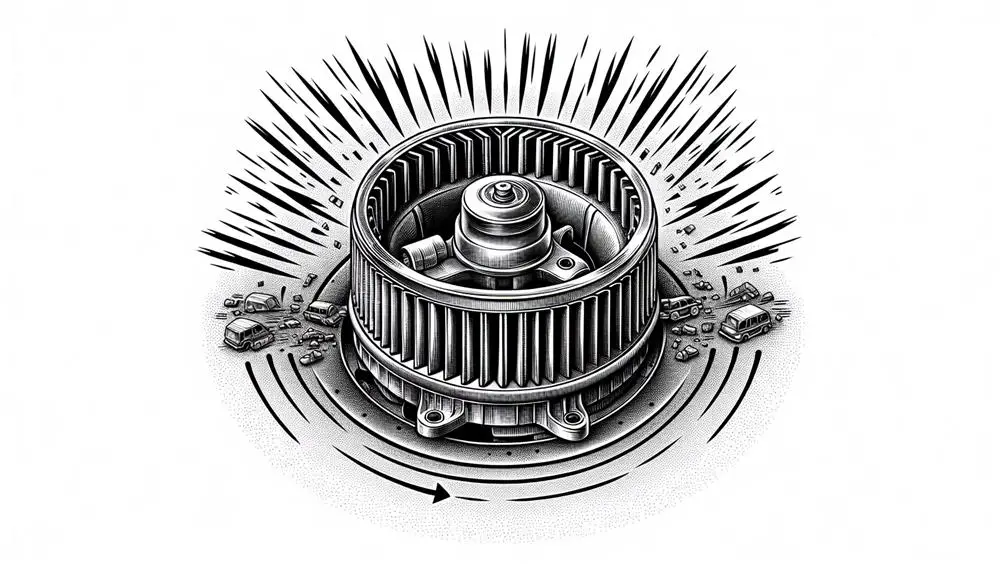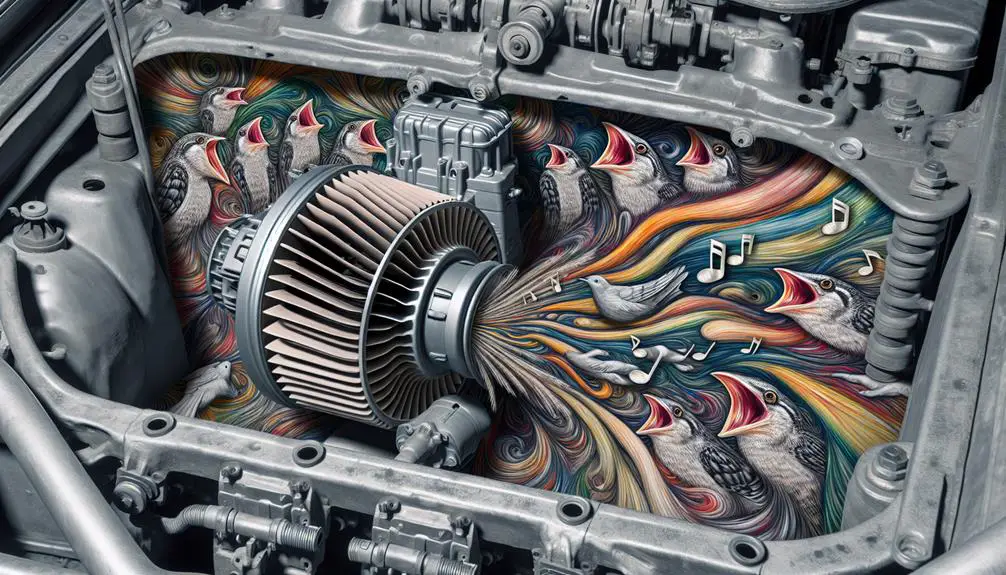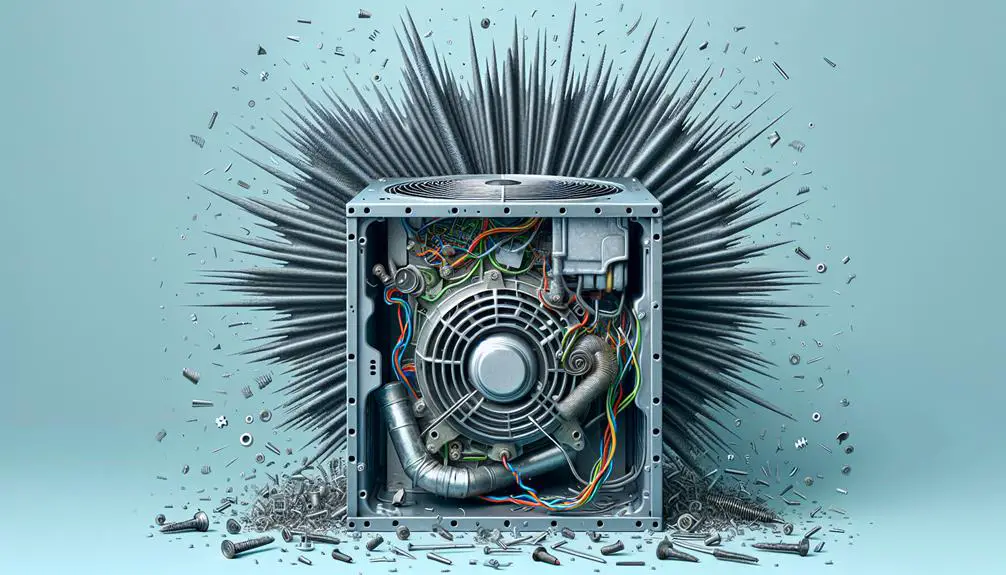A broken blower motor may sound like a rattle or a high-pitched squeal, ranging from a gentle hissing to an aggressive clanking.
Identifying this change in sound is crucial for diagnosing issues with your vehicle's climate control system.
Identifying the Rattle

Often, you'll notice a broken blower motor by a distinct rattling noise emanating from your HVAC system. This sound isn't just annoying; it's a clear sign that something's not right. You're probably wondering what's causing it and how you can fix it. Let's delve into the nitty-gritty of identifying the rattle and comprehend what it means for your HVAC's health.
To begin with, the rattle often stems from loose components within the blower motor itself or its surrounding assemblies. Over time, screws, brackets, or other fasteners can loosen, leading to parts vibrating against each other or the motor's housing. It's like when you're driving a car with a loose part; you'll hear it rattle, especially at certain speeds or when hitting bumps.
Additionally, debris accumulation is another culprit. Leaves, twigs, or even small toys if you have kids, can fall into the ducts and end up near the blower motor. When the system kicks in, these items can cause a rattling sound as they're tossed around. This scenario is more common than you'd think, and it's a reminder to regularly clean your vents and inspect for blockages.
Addressing the rattle involves tightening any loose parts and clearing away debris. Ignoring it won't make it go away and can lead to more important issues down the line. Remember, your HVAC system's efficiency and lifespan depend significantly on regular maintenance and promptly addressing problems like these.
The Squealing Symphony
If your HVAC system starts emitting a high-pitched squeal, it's likely signaling an issue with the blower motor's belt or bearings. This sound, often compared to nails on a chalkboard, can be incredibly grating and is a clear sign that your system needs attention. Unlike the more subtle clues of wear and tear, a squealing noise is hard to ignore and should prompt you to act quickly to prevent further damage.
Comprehending why your HVAC is part of this unwelcome symphony is key. Here are three key reasons:
- Worn-out Bearings: Over time, the bearings in the blower motor can wear out because of friction and lack of lubrication. This wear and tear lead to a squealing noise as the motor struggles to function smoothly.
- Loose or Damaged Belt: If your system uses a belt-driven blower, the belt can become loose or frayed over time. A loose belt slips, while a frayed one can create a squealing sound as it deteriorates further with each rotation.
- Misalignment: Sometimes, the components of the blower motor can become misaligned. This misalignment causes parts to rub against each other in ways they're not supposed to, resulting in a high-pitched squeal.
Addressing these issues often involves inspecting the blower motor, tightening or replacing the belt, lubricating the bearings, or realigning the motor components. It's a task that you might be able to tackle yourself if you're handy. However, if you're unsure, it's always best to call a professional to make sure your HVAC system is in top shape and squeal-free.
Hissing or Whistling Noises

While addressing the squeals of a worn blower motor is important, don't ignore the hissing or whistling sounds that your HVAC system might as well produce. These noises, often less alarming at initial listen, can indicate important issues that shouldn't be overlooked. If you're hearing a hissing or whistling, it's time to pay closer attention to your system.
Hissing sounds typically suggest a problem with the air pressure in your system. This could mean there's a leak in your ductwork or that the seals around your blower motor aren't tight. Air escaping through these tiny gaps creates that hissing sound you're hearing. It's not just an irritation; it's a sign that your system is losing efficiency, forcing it to work harder and possibly shortening its lifespan.
Whistling noises often have a similar root cause. However, they can also point towards a more specific issue like a clogged filter. When air struggles to pass through a dirty filter, it can create a whistling sound as it squeezes through the limited space. This not only strains your blower motor but can also significantly reduce your indoor air quality.
Don't dismiss these sounds as normal operation noise. They're your HVAC system's way of crying for help. Ignoring them can lead to more serious damage and, ultimately, more expensive repairs. Regular maintenance checks can catch these issues early, but if you've already noticed these sounds, it's time to call in a professional. They can pinpoint the exact cause and fix it before it escalates into a bigger problem.
Buzzing and Humming Sounds
Buzzing and humming sounds from your HVAC system shouldn't be ignored, as they can signal underlying electrical issues. These noises might seem harmless at the outset, but they're often indicators that something's not quite right within your system. Comprehending what these sounds could mean is vital to maintaining a healthy and efficient HVAC system.
When you hear these noises, it's vital to act quickly. Here are three key steps you should take:
- Identify the Source: Try to pinpoint where the buzzing or humming is coming from. Is it near the blower motor, or does it seem to be emanating from another component? Locating the source can help you communicate more effectively with a professional.
- Check the Electrical Connections: Sometimes, loose or faulty electrical connections can cause these noises. If you're comfortable and knowledgeable about electrical systems, you can visually inspect the connections. However, if you're unsure, it's always safer to call in a professional.
- Schedule a Professional Inspection: A trained HVAC technician can provide a thorough diagnosis of the problem. They'll be able to determine if the issue lies with the blower motor itself or another component of your HVAC system.
Ignoring buzzing and humming sounds can lead to further damage and potentially costly repairs down the line. It's not just about the noise; it's a warning sign that your system needs attention. By taking prompt action, you can guarantee your HVAC system remains in top condition, preventing more serious issues from developing.
Clanking and Banging

After addressing buzzing and humming sounds, it's important to turn our attention to clanking and banging noises, which signal a different set of potential issues in your HVAC system. These sounds are hard to ignore and often indicate something more serious. Let's delve into what you're dealing with and how to tackle it.
Clanking and banging noises usually mean there's a loose or broken part. Unlike the soft humming of a working motor, these sounds are jarring and suggest an immediate need for inspection. You might be dealing with a loose blower wheel or a motor mount that's given way, both of which can cause significant damage if not addressed quickly.
To keep you engaged, here's a quick rundown of potential causes and their fixes:
| Cause | Fix |
|---|---|
| Loose blower wheel | Tighten or replace the blower wheel. |
| Damaged belt | Replace the belt. |
| Broken motor mount | Secure or replace the motor mount. |
If you're hearing these unsettling noises, it's best not to ignore them. Depending on your comfort and skill level, you might be able to investigate the issue yourself. However, for most homeowners, calling a professional is the safest route. They can precisely identify the problem, ensuring your system returns to its quiet, efficient operation. Remember, addressing these sounds early can prevent more extensive, costly repairs down the line. So, don't wait until the banging and clanking become the soundtrack of your daily life.
Conclusion
You've now become familiar with the symphony of sounds a broken blower motor can make. From the unsettling rattle, the high-pitched squeals, to the hissing, buzzing, and the unmistakable clanking, you're well-equipped to identify when your blower motor is crying out for help.
Remember, these noises aren't just annoyances; they're your initial sign that it's time to inspect and potentially replace your blower motor. Don't ignore them—addressing these sounds promptly can save you from bigger headaches down the line.